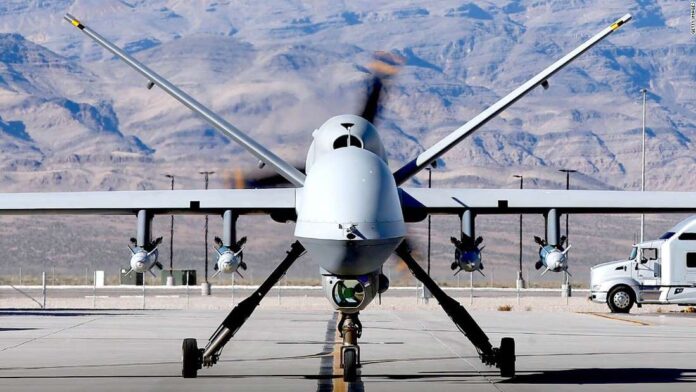(CNN)The US State Department informed Congress Thursday of the Trump administration’s intent to sell 18 armed MQ-9B drones to the United Arab Emirates for an estimated $2.9 billion, a congressional aide told CNN on Friday.
The department also informed Congress the administration intends to sell approximately $10 billion in ordnance, including precision-guided munitions, so-called “dumb” bombs, air-to-air missiles, and air-to-ground missiles, said the aide, who spoke anonymously to discuss the details of the intended sales.
This comes a week after President Donald Trump’s administration issued an informal notice to Congress of an intended sale of 50 F-35 jets to the oil-rich Gulf nation. That sale is estimated at around $10 billion, according to two Democratic congressional aides.
The sale of the advanced fighter jets to the UAE was reportedly put on the fast track by the Trump administration as it worked to establish diplomatic relations between the UAE and Israel. That sale could be formalized in the next few months.
Reuters was the first to report on the MQ-9B drone notification.
The State Department did not comment on the notification to Congress for the drone sale. A department official told CNN on Friday: “As a matter of policy, the Department does not publicly confirm or comment on proposed defense sales or transfers until they have been formally notified to Congress.”
The informal notification process is a common practice in which the House Foreign Affairs Committee and Senate Foreign Relations Committee get a heads up on planned sales, allowing committee leadership to raise concerns, give their input or place holds.
Commenting on the intended F-35 sales to the UAE, House Foreign Affairs Committee Chairman Eliot Engel said the move required “careful consideration.”
“This technology would significantly change the military balance in the Gulf and affect Israel’s military edge,” the New York Democrat said last week. “The F-35 Joint Strike Fighter is a game-changing stealth platform boasting advanced strike capability and unique sensor technology. The export of this aircraft requires very careful consideration and Congress must analyze all the ramifications. Rushing these sales is not in anyone’s interest.”
Under US policy, the United States is committed to maintaining Israel’s “qualitative military edge” (QME) — the comparative technological, tactical, and other advantages in its weapons that allow Israel to still maintain military superiority in the region. US Defense Secretary Mark Esper has met several times with his Israeli counterpart Benny Gantz in recent weeks and has reiterated the US commitment to Israel’s QME.
Gantz and Prime Minister Benjamin Netanyahu said in a joint statement two weeks ago that they “both agree that since the US is upgrading Israel’s military capability and is maintaining Israel’s qualitative military edge, Israel will not oppose the sale of these systems to the UAE,” in apparent reference to the potential sales of F-35s.
A CNN investigation last February revealed that the UAE and Saudi Arabia — key allies in a campaign to crush Iranian-backed Houthi rebels in Yemen — supplied US-made equipment to al Qaeda-linked fighters, hardline Salafi militia and other fighting factions in Yemen. The findings marked a breach of agreements with Washington, which stipulated that the UAE and Saudi Arabia were legally required to receive permission to transfer equipment to other parties.
At the time, a senior UAE official denied that an unauthorized transfer had taken place, saying that the equipment remained under the “collective possession” of forces allied with the UAE. The Saudi coalition did not respond to CNN’s requests for comment.
The Trump administration cleared the UAE of wrongdoing in May of this year.

